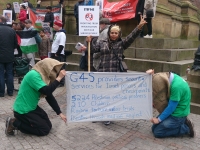G4S To End Israel Prison Contracts Following Protests

G4S, the Anglo-Danish security contractor, has agreed to withdraw from prison work in Israel after activists disrupted the company annual general meeting for the second year in a row. The company is also under fire for ill-treatment of detainees in the UK, including the death of an Angolan man.
The company employs 8,000 personnel in Israel for a variety of contracts including at several prisons where Palestinians are being held without trial, according to the Boycott, Divestment and Sanctions (BDS) movement. BDS says that G4S works at the Ketziot and Megiddo prisons, the Kishon and Moskobiyyeh detention facilities in addition to supplying equipment for the Ofer prison. G4S also provides services and equipment to Israeli checkpoints at the 430 mile security barrier that cuts through the West Bank.
At the G4S annual meeting last June, chairman John Connolly was interrupted by some 10 protestors who blew a horn and unveiled a banner that read "Stop G4S." Connolly was also questioned by Nikolaj Villumsen, a Danish member of parliament who flew to London to ask questions about the company's work in Israel. Following the protests, G4S commissioned Hugo Slim, a research fellow at the Institute of Ethics, Law and Armed Conflict at the University of Oxford, to conduct an independent human rights report. Slim's report cleared the company of abuses, although activists noted that he did not visit the prisons in question.
This June, G4S posted 29 security personnel at the company annual meeting in the Excel Centre who intervened when activists set off an alarm and disrupted the meeting. A total of 25 protesters were ejected, including several who were dragged unceremoniously from the room.
However, the company unexpectedly caved to the protesters demands. "We expect [the Israeli contracts] to expire and we don't expect to renew them," Ashley Almanza, chief executive, told the Financial Times after the meeting.
G4S may have been influenced by the fact that several large investors have started to sell stocks in the company - just a week before the annual meeting, the Bill and Melinda Gates foundation announced that it would dump a $170 million stake.
Activists urged caution. "The latest reports that G4S will not renew its contract with the Israeli Prison Service is a welcome step, but this has no immediate effect on those facing human rights violations inside Israel's prisons today," Randa Wahbe, advocacy officer with the Addameer Prisoner Support and Human Rights Association, wrote in a statement emailed to the Electronic Intifada. "G4S has a long track record of saying one thing but doing another and has not made any formal written statements about when it intends to end its contracts with the Israeli prison service and other aspects of Israel's apartheid regime."
Meanwhile, the violent treatment of the protestors at the annual meeting in London had echoes of descriptions of how G4S personnel treat detainees in the UK who refuse to comply with orders - a total of 773 complaints were lodged against the company when it was on contract with the UK Border Authority. In a 2011 report, the Chief Inspector of Prisons found conditions in a G4S run immigration center to be "objectionable, distressing" and "inhumane." In the most horrific incident to date, Jimmy Mubenga, an Angolan refugee in the UK, died in October 2010 while being restrained by G4S guards who were attempting to forcibly deport him.
Connolly defended the treatment of the protestors. "If someone refuses to leave and lies down on the floor they will be assisted to leave," he told the Guardian newspaper. "I saw one person carried out, how else do you get someone to leave if they continue [to protest] without helping them out? I do not expect any complaints on how people were taken out."
- 116 Human Rights



